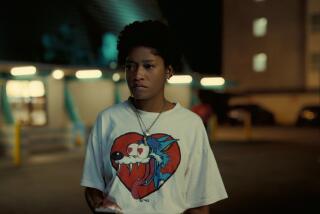Turf wars flourish in ‘The Garden’
It’s tempting to call “The Garden” a story of innocence and experience, of evil corrupting paradise, but that would be doing a disservice to the fascinating complexities of a classic Los Angeles conflict and an excellent documentary that does them full justice.
Produced and directed by Scott Hamilton Kennedy, “The Garden” takes us behind the scenes into one of the most incendiary L.A. situations of recent times. That would be the fierce battle over a 14-acre community garden at 41st and Alameda streets known as the South Central Farm, a dispute that turned so bitter and protracted it is still going on.
It’s especially fitting that Kennedy is the director. As he showed with his fine “O.T.: our town,” about a production of the Thornton Wilder play at Compton’s Dominguez High School, he’s a filmmaker with a nice sense of unforced drama and a knack for recognizing and capitalizing on stories in unglamorous parts of the city.
It’s also appropriate that “The Garden” took the top prize in June at the Silverdocs documentary festival in Washington, D.C., because its lessons about the levers of power and politics, about rebels becoming the establishment and how easy it is to get co-opted, are relevant everywhere.
Despite its virtues, “The Garden” is still a film in search of distribution, and the only way to see it theatrically is during its one-week Oscar-qualifying run at Laemmle’s Fallbrook 7 in West Hills. It’s worth the trip.
Producer-director Kennedy, who also had a hand in the cinematography, editing and sound, spent four years on this film, and that length of time has contributed to “The Garden’s” tone. We see that all the participants in this intricate drama are convinced they are right.
South Central Farm, sometimes called the largest community garden in the U.S., came into existence in 1992 on a parcel of city-owned land as part of a desire to do something positive for the community after the Rodney King verdict-inspired riots. Says Doris Block, one of the prime movers in the garden project, “land, people, food -- it’s a pretty simple idea. Happy days.”
In fact, what we can see of the group of 372 largely Latino families who work the land indicates that they are as happy as they can be with the chance to grow crops including corn and beans, papayas and bananas. Until the eviction notice comes.
It turns out that Los Angeles had paid developer Ralph Horowitz $5 million for this land in 1986 when the city wanted to build an incinerator on the property before an activist named Juanita Tate organized the community to stop the project.
Suddenly, in 2003, the city sold the land back to Horowitz, who planned to develop it. Though everything was strictly legal, the deal was initially done in secret and, remarkably, given how much real estate values had risen in the last 20 years, for virtually the same $5 million the city had originally paid Horowitz. It was a move supported by Tate and Councilwoman Jan Perry, two individuals who clearly understand the nature of power and influence.
The South Central farmers, feeling their rights were being trampled on, found civil rights attorney Dan Stormer and fought back. They were helped by activists such as former Black Panther Deacon Alexander as well as celebrities such as Daryl Hannah and Willie Nelson.
This struggle was not without its costs, including battles that broke out between factions of farmers. As much as it is a potent human drama, “The Garden” is a case study in how hardball politics is played and why it is so difficult to take on the system. Not that anyone has given up the fight. As a story in the L.A. Times this week pointed out, the battle over this piece of land is far from over. What “The Garden” does is demonstrate what it’s all about and why it’s important.
--
“The Garden.” MPAA rating: Unrated. Running time: 1 hour, 35 minutes. Laemmle’s Fallbrook 7, 6731 Fallbrook Ave., West Hills, (818) 340-8710.
More to Read
Only good movies
Get the Indie Focus newsletter, Mark Olsen's weekly guide to the world of cinema.
You may occasionally receive promotional content from the Los Angeles Times.







